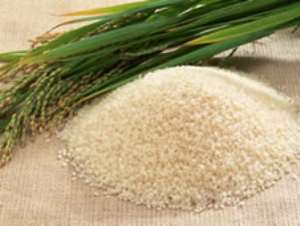
Tema, July 13, GNA – Mrs Leticia Osafo-Addo, Vice President of the Association of Ghana Industries, has advocated a comprehensive agricultural policy that would take care of the cultivation, production and marketing of locally produced staple foods.
Furthermore, she said, Ghanaians ought to change their negative attitudes and reservations towards the consumption of local products as against imported food items.
Mrs Osafo-Addo made the call when she officially launched three new brands of local rice on to the Ghanaian market in Tema at the weekend.
The brands, “Omane Ba”, “Dada Ba” and “Gold Star” are the products of GhanaMade, a company that promotes and markets made in Ghana goods.
Mrs Osafo-Addo noted that rice was fast becoming a staple food in most African countries which meant that the Ghanaian rice farmer needed new production technologies to competitively produce and supply for both the local needs and the export markets.
Mrs Osafo-Addo, who is also Chief Executive Officer of Samba Foods, was of the view that with the availability of modern technologies the Ghanaian rice farmer could basically produce more quality rice.
On the challenges facing the Ghanaian rice farmer, Mrs Osafo-Addo said notably among them were the lack of adapted variety of seeds; lack of mechanization; planting difficulties and drying, polishing and marketing of rice.
She said other macro challenges included policy and regulatory constrains; small market size that was also fragile and susceptible to external manipulation and limited financial and physical resources.
Mrs Comfort Aniagyei, Managing Director of GhanaMade reiterated the call on government to redefine and implement national policies that could lead to the achievement of collective national vision.
She suggested that issues that needed urgent attention by government included macro-economic stability, human resource development, and improvement in infrastructure and technological know-how.
Mrs Aniagyei observed that self-sufficiency in food production, sustainable economic growth, reduction of the nation's dependence on other world powers for economic survival, were some of the benefits Ghanaians “stand to benefit by patronizing made in Ghana products.”
She pledged GhanaMade's determination to continue to urge Ghanaians to believe in Ghana by reminding them to always remember that the choices they made as consumers “translate directly into jobs within Ghana, and economic independence for the country.”
Mrs Sabina Anokye Mensah, Food Scientist, who chaired the function, said statistics indicate that Ghana's rice demand currently stands at 700,000 metric tones, “but the local rice farmer is able to produce only 150,000 metric tonnes, thus leaving a deficit of 550,000 metric tonnes.”
This problem, Mrs Mensah believed, could be solved if the local rice farmer applied best and modern methods of farming.
GNA




 CODEO deploys 195 observers to monitor EC’s limited registration exercise nation...
CODEO deploys 195 observers to monitor EC’s limited registration exercise nation...
 Accra 2023: Minority demands accountability of $240million expenditure
Accra 2023: Minority demands accountability of $240million expenditure
 Man sets himself ablaze after failed attempt to kill his wife
Man sets himself ablaze after failed attempt to kill his wife
 EC targets 622,000 new voters in limited registration exercise
EC targets 622,000 new voters in limited registration exercise
 Election 2024: Mahama holds 19% lead over Bawumia among first-time voters — Glob...
Election 2024: Mahama holds 19% lead over Bawumia among first-time voters — Glob...
 Saglemi: Tenants’ Union threaten court suit against private partnership
Saglemi: Tenants’ Union threaten court suit against private partnership
 We've reduced the suffering Mahama left you – Bawumia to Ghanaians
We've reduced the suffering Mahama left you – Bawumia to Ghanaians
 It's still true, FX rate will expose weak economic fundamentals; cedi far better...
It's still true, FX rate will expose weak economic fundamentals; cedi far better...
 'I'm up to the task, competent, trustworthy, hardworking' – Bawumia
'I'm up to the task, competent, trustworthy, hardworking' – Bawumia
 EC begins nationwide limited voter registration exercise today
EC begins nationwide limited voter registration exercise today
